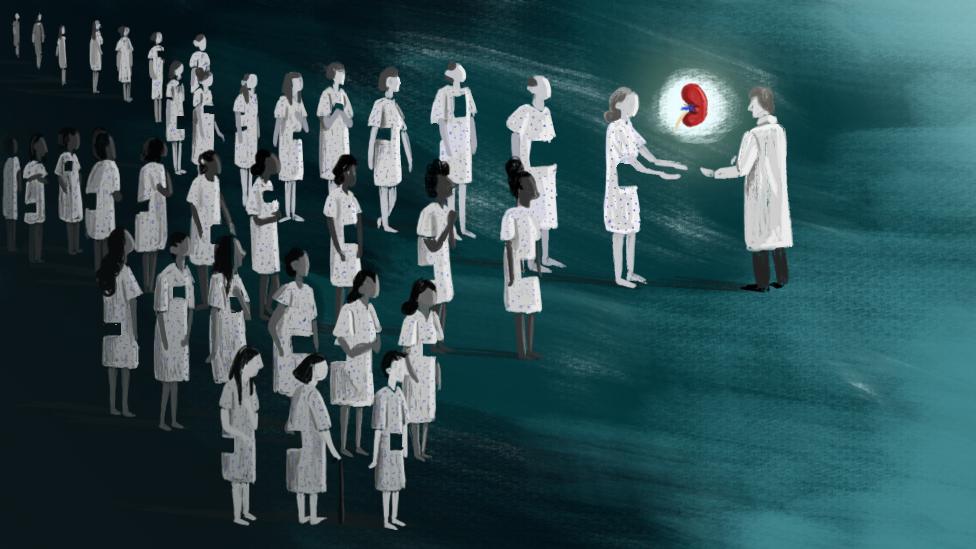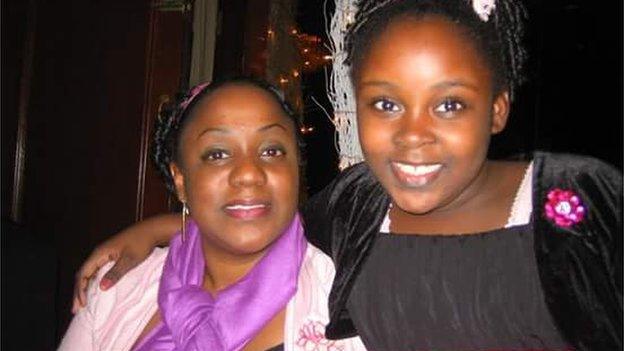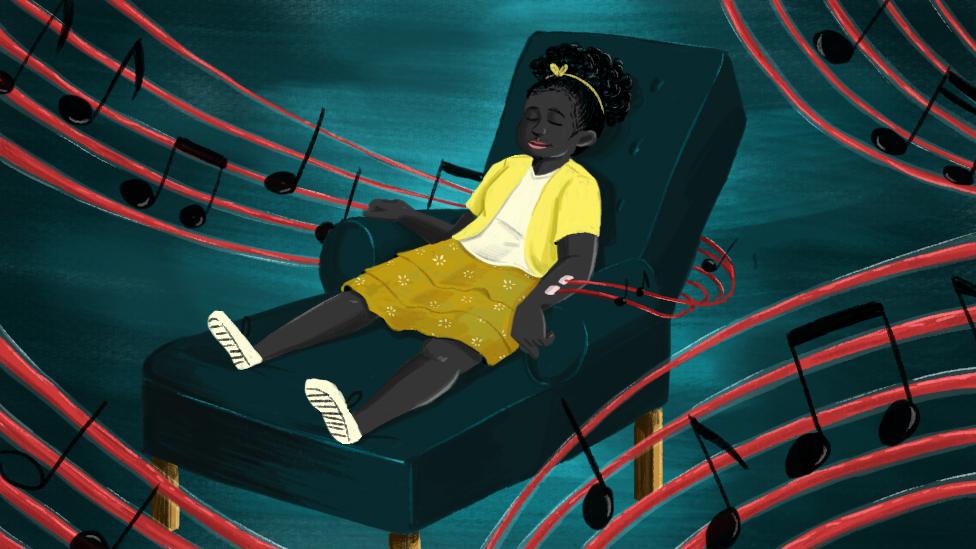Why don't more African Americans become organ donors?
- Published

When her daughter, Thalya, was diagnosed with chronic kidney disease, Chantal Onelien's initial reaction was shock. But, as Adam Harris reports, it was only the beginning of a long and difficult fight.
Thalya, then only 13 years old, would need to begin dialysis immediately, and she would also need a new kidney.
The family set out on what became a two-year journey of dialysis appointments, meetings with doctors and trying to provide Thalya a normal childhood.
"You make it work, so that it doesn't seem like doom and gloom," Onelien told the BBC.
Every ten minutes in the United States, someone is added to the national transplant list, external. Roughly 119,000 total people are on the list as of early February 2017, and almost 100,000 of those are waiting for a kidney. There are not nearly enough organ donors - living or deceased - to trim that figure.
But for the Oneliens, an African-American family, the odds were even greater.
In 2016, African Americans accounted for 30% of the overall organ donation waiting list, and 33% of the kidney list, despite being only 13% of the US population.
A black organ recipient doesn't have to have a black donor. But they would be more likely to have a successful match - based on certain genetic markers and antibodies - if more black donors were available. The percentage of black Americans who donate organs has risen since 1988, but there is still an outsized need.
Faced with these odds, the Oneliens started a social media campaign, using the hashtag #KidneyForThalya on Twitter, and a Facebook page that called for donations, shared inspirational stories of successful transplants and posted educational material about organ donation.

Chantal and Thalya
Chantal Onelien is familiar with some of the reasons why African Americans might not want to donate, including a distrust of doctors. "People sometimes believe that not only will they not try to save your life, but will try to use your organs as experiments," she says.
"And it's hard to defuse some of that thinking - to debunk and demystify it."
Mistrust of the medical community among African Americans is not uncommon, and not without historical justification.
In the Tuskegee syphilis experiment, black men in Alabama were promised free medical care, and then unknowingly signed up for a long-term research study into the effects of syphilis. When a cure became available, the men were denied treatment so that the study could continue.
Henrietta Lacks went to John Hopkins for cervical cancer treatment, where a doctor took samples from her cervix and used them to develop one of the most-used cell research lines - all without her permission or knowledge.
Derek DuBay, chief transplant surgeon at the Medical University of South Carolina, believes there is much more at play than just mistrust in the medical community.
So Dr DuBay, alongside a team of researchers, used surveys and focus groups to find out why there was a such a disparity between black and white donors. They found many African Americans cited fear that their organs would not be usable due to high blood pressure, heart disease and other prevalent ailments in the black community.
The researchers concluded, external that often, it's a simple matter of educating people about organ donation.
"We need to enhance education to let them know that a lot of times these organs are acceptable for transplant," Dr DuBay says. "And even though the heart might not be good for transplant," another organ might be.
Julius Wilder, professor at the Duke Clinical Institute, agrees.
"While there may be mistrust in the African-American community surrounding organ donation," Dr Wilder says, "it is not a barrier to the extent that lack of education or access is".
Access, Dr Wilder says, is key to driving both living and deceased donations.
"Minorities are more likely to live in places with less economic and healthcare resources.
"This is a vicious cycle that feeds on itself because these resource poor environments make people sicker and they often have greater need for organ transplantation."

The treatment centre helped by providing activities like music and entertainment during dialysis, Onelien says, making it seem less like a chore
The lack of access is found in both rural communities and urban centres in close proximity to transplantation hospitals.
"If you do not have health insurance or strong social support resources," he says, meaning both emotional and tangible support, such as money or childcare, "you will not have access to transplantation".
Donor advocates are now trying to steer kidney donors of all races towards living donations.
Josh Morrison and Thomas Kelly were both living donors. They started Waitlist Zero to educate the general public abut living donation and chip away at the growing waitlist.
Organs such as kidneys, segments of the liver, and portions of the pancreas and intestine can be donated with the donor continuing to live a healthy life.
Unfortunately, African Americans are the least likely group to receive a kidney donation from a living donor. But Mr Morrison hopes public education campaigns can change that.
"If you ask people who've donated, they get this surge of just purpose and energy," Chantal Onelien says. "It's like, 'Wow, I saved someone's life'."
In June, the Obama administration announced several measures it was taking to address the overall waiting list, including $200m for research and development, and promoting new technology to make registering as an organ donation easier.
On 19 November, the Oneliens got the call - there was a deceased donor and kidney for Thalya. The family spent 33 days in hospital, after minor complications led to more procedures than anticipated. Just days before Christmas, they went home.
With Thalya in recovery, the Oneliens are now looking forward to the future.
When asked whether they planned to continue to raise awareness about organ donation, Chantal Onelien says: "Absolutely. Now more than ever."